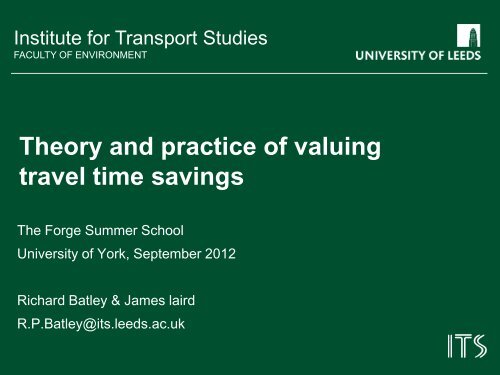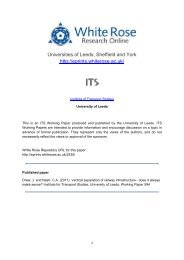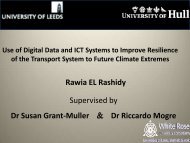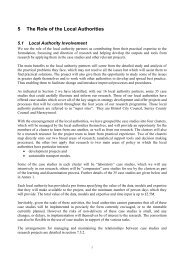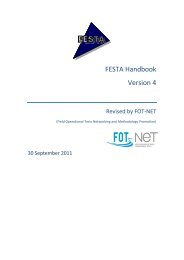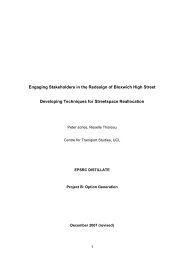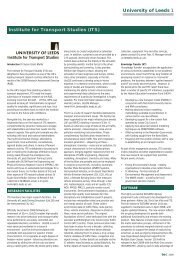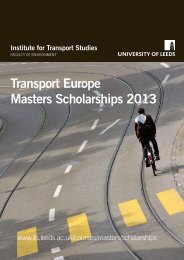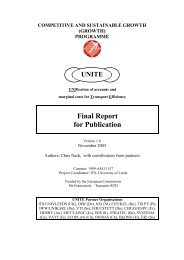view presentation PDF - Institute for Transport Studies - University of ...
view presentation PDF - Institute for Transport Studies - University of ...
view presentation PDF - Institute for Transport Studies - University of ...
You also want an ePaper? Increase the reach of your titles
YUMPU automatically turns print PDFs into web optimized ePapers that Google loves.
<strong>Institute</strong> <strong>for</strong> <strong>Transport</strong> <strong>Studies</strong><br />
FACULTY OF ENVIRONMENT<br />
Theory and practice <strong>of</strong> valuing<br />
travel time savings<br />
The Forge Summer School<br />
<strong>University</strong> <strong>of</strong> York, September 2012<br />
Richard Batley & James laird<br />
R.P.Batley@its.leeds.ac.uk
Some questions that we will<br />
consider…<br />
• What are travel time savings<br />
• Are travel time savings important to a scheme appraisal<br />
• Why would people pay to save travel time<br />
• How do we measure the value <strong>of</strong> travel time savings<br />
• How do values vary
Structure<br />
• Part 1: Introduction<br />
• Part 2: Defining travel time savings<br />
• Part 3: Business and freight travel time savings<br />
• Part 4: Non-work travel time savings<br />
• Part 5: Time savings in a <strong>for</strong>ecasting and appraisal<br />
• Part 6: Contentious issues<br />
• Part 7: Conclusions
Part 1: Introduction
Context<br />
In practical scheme appraisal, the proposition is that...<br />
Overall<br />
Economic<br />
Impact<br />
= Change in<br />
transport user<br />
benefits<br />
+ Change in system<br />
operating costs<br />
and revenues<br />
+ Change in<br />
costs <strong>of</strong><br />
externalities<br />
- Investment costs<br />
(including<br />
mitigation<br />
measures)<br />
Reliability<br />
Time<br />
Scheduling<br />
Com<strong>for</strong>t<br />
Frequency<br />
Quality
Are travel time savings important<br />
100.0%<br />
Contribution to PVB <strong>for</strong> 101 rural schemes on the<br />
NSR, Ireland by impact (showing 15th centile,<br />
median and 85th centile)<br />
80.0%<br />
60.0%<br />
40.0%<br />
20.0%<br />
15th centile<br />
85th centile<br />
median<br />
0.0%<br />
-20.0%<br />
Air and climate<br />
change<br />
Noise Accidents <strong>Transport</strong><br />
Efficiency &<br />
Effectiveness<br />
Wider Economic<br />
Impacts<br />
Source: National Secondary Roads Needs Study, Ireland (RPS et al. 2011)
Part 2: Defining travel time<br />
savings
What are travel time savings<br />
• Can we save time<br />
– If only....<br />
• However, we can transfer time from one activity to another.<br />
– Work<br />
– Housework<br />
Leisure<br />
– Travel<br />
Work<br />
More travel
What are travel time savings<br />
The value <strong>of</strong> transferring time from<br />
travel to something else<br />
....and that something else can include more travel!
Why pay to save travel time<br />
Business<br />
– Employees will spend more time<br />
working not travelling (increased<br />
productivity)<br />
Freight<br />
– Increased productivity <strong>of</strong> vehicle<br />
and driver<br />
Non-work<br />
– More leisure time<br />
– More time to do jobs (e.g. paint<br />
the lounge)<br />
– Ability to travel more may open up<br />
access to new activities/locations<br />
Eurostar
Part 3: Business and freight<br />
travel time savings
Theory <strong>of</strong> VTTS:<br />
Business and Freight<br />
• Cost saving approach:<br />
VTTS = wage rate + labour related overhead<br />
• Rationale:<br />
Firms hire workers until the value <strong>of</strong> their output = their wage rate<br />
– With a time saving (increased productivity <strong>of</strong> labour <strong>for</strong>ce):<br />
• Firms increase output with given labour <strong>for</strong>ce; OR<br />
• Firms keep output constant and use less labour releasing labour<br />
into the market<br />
– In each case, firms gain an amount equal to the value <strong>of</strong> the wage<br />
rate <strong>of</strong> the labour x the no. <strong>of</strong> hours/labour units saved
Part 4: Non-work travel<br />
time savings<br />
COMMUTING<br />
SHOPPING<br />
LEISURE<br />
VISITING FRIENDS AND FAMILY<br />
PERSONAL BUSINESS<br />
ESCORT (e.g. PICKING KIDS UP)
Theory <strong>of</strong> non-work VTTS<br />
VTTS = Marginal utility <strong>of</strong> transferring time from travel to leisure<br />
Marginal utility <strong>of</strong> income<br />
• Theory cannot be used to support any particular value, as VTTS will be<br />
influenced by:<br />
– Relative (dis)utilities <strong>of</strong> travel and leisure<br />
– How much time is spare, the manner in which the time constraint binds,<br />
and the consequences <strong>of</strong> being late<br />
– Whether travel time constrains access to activities/locations<br />
– The marginal utility <strong>of</strong> income<br />
• There<strong>for</strong>e require empirical evidence, usually a mixture <strong>of</strong>:<br />
– Revealed Preference (RP); and<br />
– Stated Preference (SP)
Non-work VTTS<br />
How it varies - empirics<br />
• Non-work VTTS found to vary by/over (all other things being<br />
equal):<br />
– Journeys<br />
• Journey purpose<br />
• Mode<br />
• Conditions (overcrowded, free-flow)<br />
• Group size<br />
• Journey length<br />
– People<br />
• Income<br />
• How tightly time constraints bind (gender, culture)
Part 5a: Time savings in<br />
<strong>for</strong>ecasting
Time savings in <strong>for</strong>ecasting<br />
• Essential to use perceived (i.e. behavioural) values to<br />
ensure accurate demand <strong>for</strong>ecasting<br />
• Values <strong>of</strong> time savings need to vary by:<br />
– Travel cost/distance and income<br />
– Size and sign <strong>of</strong> time saving may also be important<br />
• Most important <strong>for</strong> transport pricing:<br />
– Toll roads, public transport, road pricing, etc<br />
• BUT, pragmatism may be necessary:<br />
– Cannot collect data on all variables and scenarios
Non-work VTTS: Formula<br />
used <strong>for</strong> <strong>for</strong>ecasting in UK<br />
• ITS Leeds & Bates (2003) proposed an identity relating<br />
VTTS to travel cost and income:<br />
where:<br />
VTTS<br />
cost<br />
<br />
time cost1 income1<br />
<br />
cost cost0 income0<br />
<br />
income<br />
subscripts 0 and 1 refer to ‘base’ and ‘<strong>for</strong>ecast' scenarios<br />
β time , β cost, ε cost and ε income are parameters estimated from SP<br />
data
Part 5b: Time savings in an<br />
appraisal
The effect <strong>of</strong> income<br />
• In practice, value <strong>of</strong> time savings varies with wages<br />
(business) and income (non-work)<br />
– Result: benefits are higher in richer areas ceteris paribus<br />
• Is this the right thing <strong>for</strong> appraisal from a policy perspective<br />
– Yes if you can:<br />
• Collect data on the incomes <strong>of</strong> travellers<br />
• Conduct a distributional analysis, and thereby compare schemes<br />
effectively between one region and another<br />
– No if you can’t
The effect <strong>of</strong> income – national<br />
appraisal<br />
• UK<br />
– Standard values <strong>for</strong> UK<br />
– Non-work: average income assumed (equity value)<br />
– Business: wage varies by mode and driver/passenger<br />
– Freight: wage <strong>of</strong> driver constant across vehicles<br />
• EU (Odgaard, Kelly and Laird, 2005)<br />
– Standard values dominate but some variation in VTTS<br />
– Income (Netherlands and Switzerland)<br />
– Others:<br />
• Drivers and passengers (Netherlands and UK)<br />
• Urban/interurban (France)<br />
• Journey length (France, Switzerland and Sweden)<br />
• Delays (Denmark and Sweden)<br />
• Days <strong>of</strong> the week (Hungary)
Non-work VTTS: Values used<br />
<strong>for</strong> appraisal in UK<br />
• WebTAG unit 3.5.6<br />
Table 2: Values <strong>of</strong> non-work time per person<br />
(£ per hour, 2002 prices and values)<br />
Purpose Resource Cost Perceived Cost Market Price<br />
Commuting 4.17 5.04 5.04<br />
Other 3.68 4.46 4.46<br />
• Applies to all modes except:<br />
– Walk/cycling valued at 2 times values above<br />
– Wait time valued at 2.5 times values above<br />
• Year on year REAL growth in value <strong>of</strong> time <strong>of</strong> 0.8*growth in REAL GDP/capita<br />
• Variation by income <strong>for</strong> tolling/road pricing studies only (WebTAG unit 3.12)
Time savings and economic<br />
impact<br />
• Historically have always been <strong>view</strong>ed as an economic<br />
impact.<br />
• But are all time savings related to the economy<br />
– Yes directly: business and freight time savings<br />
– Yes indirectly: commuting, shopping/retail, tourism<br />
– Not really: visits to friends, pure leisure, etc.<br />
• Really, time savings are a mixture <strong>of</strong>:<br />
– Economy<br />
– Accessibility
Part 6: Contentious issues<br />
SMALL TIME SAVINGS<br />
INCREASED TRAVEL<br />
PRODUCTIVE USE OF TIME
Small time savings<br />
• < 3 mins or < 5 mins<br />
• Can comprise 25% to 50% <strong>of</strong> time savings (Welsh and<br />
Williams, 1997)<br />
• But 3 arguments against small time savings<br />
– Perception<br />
– Usability<br />
– Error
Increased travel<br />
• Transferring time to increased travel<br />
– Valid economic response<br />
– To access new more attractive/useful destinations, to move house, to<br />
move job<br />
• Travel time budget concept (see e.g. Metz, 2004) is<br />
there<strong>for</strong>e broadly consistent with concept <strong>of</strong> VTTS<br />
• Might not be desirable from a policy perspective, BUT:<br />
– DON’T SHOOT THE MESSENGER; instead<br />
– Take into account elsewhere in the appraisal
Business travel:<br />
The productive use <strong>of</strong> time<br />
• Cost saving approach implicitly assumes all business travel<br />
time is unproductive<br />
– What about train travel<br />
• If train travel is productive:<br />
– Time saving benefits are diminished <strong>for</strong> existing travellers<br />
– Need to factor in crowding effects, distance effects, etc. on<br />
productivity <strong>of</strong> work whilst travelling<br />
– Need to separate walking and waiting in the modelling <strong>of</strong> train<br />
journey times<br />
– Need to factor in scheduling constraints <strong>for</strong> business meetings etc.<br />
• Problem is not straight<strong>for</strong>ward
Part 7: Summary
Summary<br />
• Can’t save time only transfer it to something else<br />
• Value <strong>of</strong> travel time saving is a function <strong>of</strong> the difference in<br />
how productive time is whilst travelling and how productive it<br />
is in the activity it is transferred to<br />
• Business and freight VTTS is a function <strong>of</strong> the wage<br />
– Varies by any aspect <strong>of</strong> travel that affects productivity<br />
• Non-work can only be surveyed; and:<br />
– Varies by inconvenience/discom<strong>for</strong>t, income, consequences <strong>of</strong> travel<br />
• Remains contentious as it dominates appraisal and appears<br />
to work against more sustainable policies, but:<br />
– Don’t shoot the messenger
References<br />
• Abrantes and Wardman (2011) Meta-analysis <strong>of</strong> UK values <strong>of</strong> travel time: an update. <strong>Transport</strong>ation<br />
Research Part A, 45, pp1-17.<br />
• Axhausen, Konig, Bates, Bierlaire (2004) Swiss Value <strong>of</strong> Travel Time Savings. European <strong>Transport</strong><br />
Conference 2004.<br />
• De Jong, G., Bakker, S., Pieters, M. and Wortelboer-van-Donselaar, P. (2004), ‘New Values <strong>of</strong> Time and<br />
Reliability in Freight <strong>Transport</strong> in the Netherlands’, Proceedings <strong>of</strong> the European <strong>Transport</strong> Conference,<br />
2004.<br />
• Department <strong>for</strong> <strong>Transport</strong> (2011) Values <strong>of</strong> time and vehicle operating costs. TAG Unit 3.5.6.<br />
www.webtag.org.uk<br />
• Fowkes, A.S. (1999) Issues in Evaluation. A justification <strong>for</strong> awarding all time savings, both small and<br />
large, equal unit value in scheme evaluation. In AHCG (1999) The Value <strong>of</strong> Travel Time on UK Roads,<br />
The Hague Consulting Group, The Hague, Netherlands., pp341-359.<br />
• Fowkes, A.S. (2001) Principles <strong>of</strong> Valuing Business Travel Time Saving. ITS Working Paper 562,<br />
<strong>Institute</strong> <strong>for</strong> <strong>Transport</strong> <strong>Studies</strong>, <strong>University</strong> <strong>of</strong> Leeds, UK.<br />
• Hensher, D.A. (1977) Hensher, D.A. (1977) Valuation <strong>of</strong> Business Travel Time. Ox<strong>for</strong>d:Pergamon Press.<br />
• Mackie, P.J., Jara-Diaz, S.R. and Fowkes, A. (2001) The value <strong>of</strong> travel time savings in evaluation.<br />
<strong>Transport</strong>ation Research Part E, 37(2), pp91-106.<br />
• Metz, D.A. (2004) Travel time – variable or constant Journal <strong>of</strong> <strong>Transport</strong> Economics and Policy, 38(3),<br />
pp333-344<br />
• Odgaard, Kelly and Laird (2005) Current practice in project appraisal in Europe. European <strong>Transport</strong><br />
Conference 2005.<br />
• Shires and De Jong (2009) An international meta-analysis <strong>of</strong> value <strong>of</strong> time studies. Evaluation and<br />
Program Planning, 32, pp315-325.<br />
• Welch, M. and Williams, H. (1997) ‘The Sensitivity <strong>of</strong> <strong>Transport</strong> Investment Benefits to the Evaluation <strong>of</strong><br />
Small Travel-Time Saving’ Journal <strong>of</strong> <strong>Transport</strong> Economics and Policy 31 pp231-254


